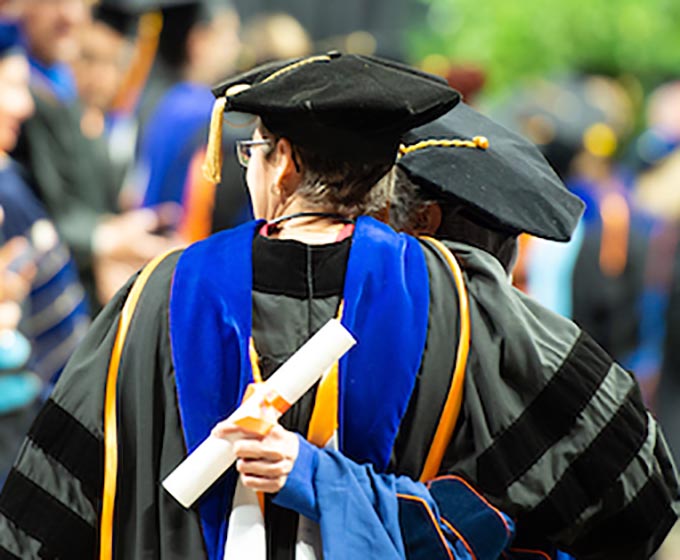
Nov. 20, 2019 — Editor's note: Provost and Senior Vice President for Academic Affairs Kimberly Andrews Espy today sent the following message to faculty and staff.
Dear Colleagues,
Graduate education has been a mainstay of UTSA since its very inception. It can be hard to remember — on our bustling campuses with 32,000+ students — that when the university first began offering coursework in 1973, it offered only graduate-level programs, and indeed for the next two years (until UTSA began admitting upper-level undergraduates in 1975), all UTSA students were graduate students. Fast-forward nearly 50 years, and graduate education remains an important part of our mission — and will play a vital role in assuring UTSA realizes its strategic vision.
I am pleased today to announce the launch the Graduate Student Success for Faculty Excellence Initiative, to deepen UTSA’s abilities to recruit and retain the best and brightest graduate students to complete their degrees and pursue meaningful careers across multiple sectors.
UTSA awarded 1,467 graduate degrees in the 2018–2019 academic year — a record high! We are proud of that fact, and even more so of the 1,467 graduate students who accomplished their goal of pursuing more in-depth knowledge in their chosen fields.
As we celebrate the successes of those master’s and doctoral graduates, the university has set higher goals for graduate enrollment and degree completion in line with its strategic vision to be a model for student success and a great research university. The landscape of graduate education in the U.S. has changed dramatically since UTSA opened its doors in response to evolving academic disciplines, new technologies and workforce needs, changing job markets and other factors. As an institution of higher education, UTSA, too, must adapt to these changes to best serve those students seeking to advance their careers through graduate education. Further, as a pre-eminent Hispanic-Serving Institution in the U.S., the university has a special responsibility to increase participation and success of Latinx students in graduate programs — especially at the doctoral level — to increase the diversity of our nation’s faculty and enhance an inclusive workforce to better serve our students and communities.
Vice Provost and Dean of the Graduate School Ambika Mathur will lead this effort, and she has assembled a broadly representative task force of graduate students, graduate faculty and other stakeholders across the university.
Through the Graduate Student Success for Faculty Excellence Initiative, UTSA seeks to advance graduate education at the university by enhancing value-added programming and postdoctoral training; improving recruitment, admissions, diversity and funding opportunities; and modernizing graduate programs to facilitate successful career outcomes across the full spectrum of sectors. As part of its work, the task force will review all UTSA’s graduate education processes to ensure they are optimally aligned, and use data-driven evidence to inform ensuing recommendations for improving graduate recruitment and retention.
Specifically, the task force will explore these and other areas of potential high impact:
In addition to improving the student experience and career outcomes for UTSA’s graduate students, this initiative recognizes the critical role that graduate students play in support of the university’s dual mission of teaching and research. The quality of doctoral education, in particular, is inextricably linked to the university’s visionary destination as a Great Public Research University. Graduate research assistants provide outstanding intellectual capital and partnership to faculty in conducting research; graduate teaching assistants are essential in providing quality instruction to our diverse undergraduate student body and ensuring their timely completion and graduation. The interventions developed through the Graduate Student Success for Faculty Excellence Initiative will better enable UTSA to meet targets to enroll 5,500 master’s students and 1,200 doctoral students by 2028, and to award at least 200 Ph.D. degrees annually in support of our goals to achieve designation as a Carnegie Research 1 institution and eligibility for the National Research University Fund.
Regular updates will be provided on the Initiative website and in the monthly Vision for UTSA strategic planning newsletter. As always, I welcome your feedback.
Celebrate UTSA’s 50th Anniversary and share social media posts about the 50th using the hashtag #UTSA50.
Connect with UTSA online at Facebook, Twitter, YouTube, Instagram and LinkedIn.
UTSA Today is produced by University Communications and Marketing, the official news source of The University of Texas at San Antonio. Send your feedback to news@utsa.edu. Keep up-to-date on UTSA news by visiting UTSA Today. Connect with UTSA online at Facebook, Twitter, Youtube and Instagram.
Move In To COLFA is strongly recommended for new students in COLFA. It gives you the chance to learn about the Student Success Center, campus resources and meet new friends!
Academic Classroom: Lecture Hall (MH 2.01.10,) McKinney Humanities BldgWe invite you to join us for Birds Up! Downtown, an exciting welcome back event designed to connect students with the different departments at the Downtown Campus. Students will have the opportunity to learn about some of the departments on campus, gain access to different resources, and collect some giveaways!
Bill Miller PlazaCome and celebrate this year's homecoming at the Downtown Campus with food, games, giveaways, music, and more. We look forward to seeing your Roadrunner Spirit!
Bill Miller PlazaThe University of Texas at San Antonio is dedicated to the advancement of knowledge through research and discovery, teaching and learning, community engagement and public service. As an institution of access and excellence, UTSA embraces multicultural traditions and serves as a center for intellectual and creative resources as well as a catalyst for socioeconomic development and the commercialization of intellectual property - for Texas, the nation and the world.
To be a premier public research university, providing access to educational excellence and preparing citizen leaders for the global environment.
We encourage an environment of dialogue and discovery, where integrity, excellence, respect, collaboration and innovation are fostered.